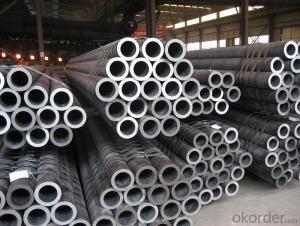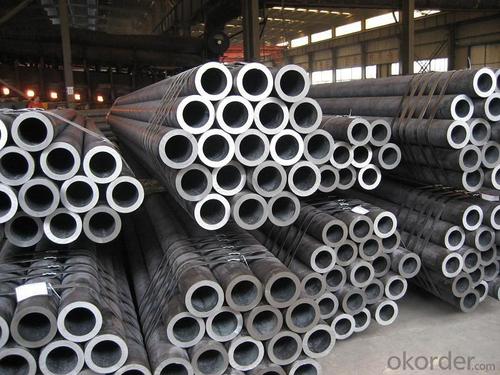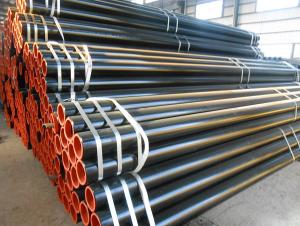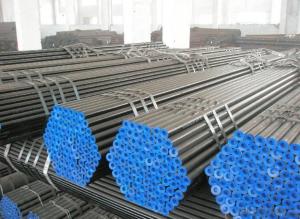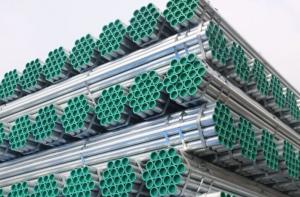BS, JIS, DIN, ASTM, API Thick Wall Seamless Steel Pipe
- Loading Port:
- Tianjin
- Payment Terms:
- TT or LC
- Min Order Qty:
- 20 m.t.
- Supply Capability:
- 15000 m.t./month
OKorder Service Pledge
OKorder Financial Service
You Might Also Like
We are company that have many years experience and professional manager team and engineer team and sales team, sure we will provide you high quality of pipe and professioanl service.
Seamless pipe possesses a hollow section and without seam around the strip steel. It is made with solid bar or steel ingot by perforating machine. As the facture process does not include any welding, seamless pipes are considered to be stronger and more durable. Generally speaking, seamless pipe has better pressure resistance and security than other classifications, and was usually more easily available than welded pipe.
2、Main Features of the Seamless Pipe:
• High working accuracy
• High strength
• Small inertia resistance
• Strong therming dissipine ability
• Good appearance
• Reasonble price
3、Seamless Pipe Specification:
Standard | GB, DIN, ASTM ASTM A106-2006, ASTM A53-2007 |
Grade | 10#-45#, 16Mn 10#, 20#, 45#, 16Mn |
Thickness | 8 - 33 mm |
Section Shape | Round |
Outer Diameter | 133 - 219 mm |
Place of Origin | Shandong, China (Mainland) |
Secondary Or Not | Non-secondary |
Application | Hydraulic Pipe |
Technique | Cold Drawn |
Certification | API |
Surface Treatment | factory state or painted black |
Special Pipe | API Pipe |
Alloy Or Not | Non-alloy |
Length | 5-12M |
Outer Diameter | 21.3-610mm |
Grade | 20#, 45#, Q345, API J55, API K55, API L80, API N80, API P110, A53B |
Standard | ASME, ASTM |
1) Material:20#(ASTM A 106/A53 GRB.API5LGRB,GB),45#,16Mn,10#.
2) Specification range: OD: 21.3-610mm, WT:6-70mm, length:6-12m or according to the requirement of clients.
3) Executive standards: GB, ASME API5L.ASTM A 106/A53,Despite of the above standards, we can also supply seamless steel pipe with standard of DIN, JIS, and so on, and also develop new products according to the requirements of our clients!
4) Surface: black lacquered, varnish coating or galvanized.
5) Ends: Beveled or square cut, plastic capped, painted.
6) Packing: bundles wrapped with strong steel strip, seaworthy packing.
4、Packaging & Delivery:
Packaging Details: | seaworthy package, bundles wrapped with strong steel strip |
Delivery Detail: | 15-30days after received 30%TT |
5、FAQ of Seamless Pipe:
①How is the quality of your products?
We have many years business experience in this area, and we have professional engineer and manager team and sure we can provide you high quality production and professional service.
②How about price?
Yes, we are factory and be able to give you lowest price below market one, and we have a policy that “ for saving time and absolutely honest business attitude, we quote as lowest as possible for any customer, and discount can be given according to quantity”,if you like bargain and factory price is not low enough as you think, just don’t waste your time.Please trust the quotation we would give you, it is professional one.
③Why should you chose us?
We can give you both.Additionally, we can also offer professional products inquiry, products knowledge train(for agents), smooth goods delivery, exellent customer solution proposals.Our service formula: good quality+good price+good service=customer’s trust
SGS test is available, customer inspection before shipping is welcome, third party inspection is no problem.
6、Seamless Pipe Images:
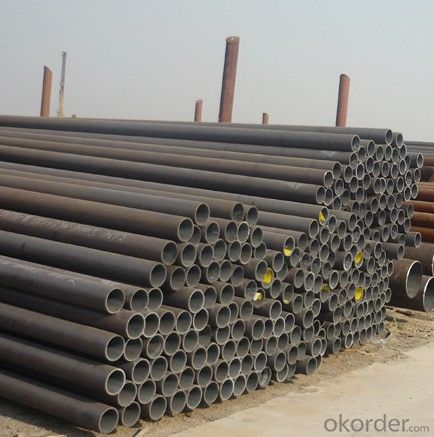
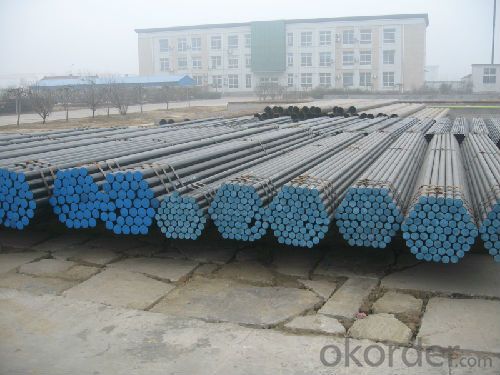
- Q: Are steel tubes and round steel in weight or length when purchased?
- The price must be measured by weight, and the length, volume and other specifications should be entered
- Q: What are the different types of supports used for aboveground steel pipes?
- There are several types of supports commonly used for aboveground steel pipes, including pipe hangers, pipe clamps, pipe saddles, and pipe shoes. These supports are designed to provide stability and prevent excessive movement or vibration of the pipes, ensuring their proper alignment and preventing damage.
- Q: How are steel pipes used in the manufacturing of conveyor systems?
- Steel pipes are commonly used in the manufacturing of conveyor systems as they provide a sturdy and durable framework for supporting and transporting materials. These pipes are used to create the structure of the conveyor, forming the framework that holds the rollers, belts, and other components in place. Steel pipes also allow for easy customization and flexibility in designing conveyor systems to meet specific needs and requirements.
- Q: Are steel pipes suitable for structural purposes?
- Indeed, steel pipes are well-suited for structural purposes. Renowned for their robustness, longevity, and flexibility, steel pipes prove to be an exceptional option for a variety of structural uses. They can endure substantial loads, furnish exceptional structural support, and exhibit resistance to both corrosion and severe weather conditions. In construction ventures, bridges, edifices, and infrastructure systems such as water and gas pipelines, steel pipes are frequently employed. Furthermore, steel pipes can be effortlessly welded, curved, and sliced to meet specific structural prerequisites, rendering them highly adaptable to diverse construction needs. On the whole, steel pipes are widely acknowledged as a dependable and effective choice for structural applications.
- Q: Are steel pipes suitable for nuclear power plants?
- Steel pipes are an ideal choice for nuclear power plants. This is because steel is a commonly used material in the construction of these plants, thanks to its exceptional mechanical properties, high strength, and durability. Various applications in nuclear power plants rely on steel pipes, including the transportation of cooling water, hot gases, and steam. The steel used in nuclear power plants undergoes careful selection and testing to meet strict safety regulations and quality standards. This is crucial because these pipes must have outstanding resistance to corrosion and high-temperature environments. They are exposed to harsh conditions such as high pressure, high temperatures, and radioactive materials. Moreover, steel pipes have a long lifespan and require minimal maintenance. This makes them a cost-effective option for nuclear power plants. They can endure extreme conditions, ensuring the plant's safe and reliable operation. Additionally, steel pipes can be easily fabricated, installed, and repaired, which is vital for the efficient functioning of a nuclear power plant. In summary, steel pipes are highly suitable for nuclear power plants due to their strength, durability, resistance to corrosion, and ability to withstand extreme conditions.
- Q: How are steel pipes used in the oil and gas industry?
- Steel pipes are extensively used in the oil and gas industry due to their durability and strength. They are used for various purposes like drilling, transportation, and processing of oil and gas. Steel pipes are employed in drilling wells, providing a conduit for the extraction of oil and gas from the ground. Additionally, they are used for gathering and transporting hydrocarbons from the wellhead to processing facilities or storage tanks. Steel pipes also play a crucial role in the construction of refineries and petrochemical plants, where they are used for the transportation of various fluids and gases involved in the refining process.
- Q: What are the safety precautions while working with steel pipes?
- Some safety precautions while working with steel pipes include wearing appropriate personal protective equipment such as gloves, safety glasses, and steel-toed boots to prevent injuries. It is important to ensure the work area is clear of any obstacles or tripping hazards. Workers should be trained in proper lifting techniques to prevent strain or back injuries. Additionally, it is crucial to follow proper procedures for handling and storing steel pipes to prevent accidents and maintain a safe working environment.
- Q: How are steel pipes used in the manufacturing of food processing machinery and equipment?
- Steel pipes are an essential component in the manufacturing of food processing machinery and equipment due to their numerous advantageous properties. These pipes are widely used in the food industry for their durability, corrosion resistance, and ability to withstand high temperatures and pressures. One of the primary applications of steel pipes in food processing machinery is for the transportation of various fluids and gases. These pipes are used to carry water, steam, and other liquids, as well as air and gases, throughout the processing plant. Steel pipes provide a reliable and hygienic means of transferring these substances, ensuring that the quality and safety of the food products are maintained. Moreover, steel pipes are also utilized in the design and construction of food processing equipment such as mixers, blenders, conveyors, and canning machines. These machines often require the use of pipes to facilitate the movement of ingredients, processing fluids, and cleaning agents. Steel pipes are an ideal choice for these applications due to their high strength, which allows them to handle the heavy loads and pressures associated with food processing operations. Another crucial aspect of steel pipes in food processing machinery is their resistance to corrosion. Food processing involves the use of various acidic and alkaline substances, as well as hot water and steam, which can cause corrosion in other materials. Steel pipes, particularly those made from stainless steel, are highly resistant to corrosion, ensuring that the machinery remains in optimal condition and prolonging its lifespan. Furthermore, the smooth internal surface of steel pipes allows for efficient and hygienic cleaning, as it minimizes the accumulation of food particles and contaminants. This is of utmost importance in the food industry, where maintaining high levels of cleanliness is essential to prevent the growth of bacteria and ensure food safety. In summary, steel pipes play a crucial role in the manufacturing of food processing machinery and equipment. Their durability, corrosion resistance, ability to handle high temperatures and pressures, and hygienic characteristics make them an ideal choice for the transportation of fluids and gases, as well as for the construction of various food processing equipment.
- Q: What are the different types of steel pipe connections for steam pipelines?
- There are several types of steel pipe connections commonly used for steam pipelines, including threaded connections, flanged connections, welded connections, and grooved connections. Each type has its own advantages and is selected based on factors such as the pipe size, pressure rating, and ease of installation and maintenance.
- Q: What is the difference between hot-finished and cold-finished steel pipes?
- Hot-finished steel pipes are produced by heating the steel to a high temperature and then passing it through a series of rollers to give it the desired shape and size. This process results in a smooth surface finish and improved mechanical properties. On the other hand, cold-finished steel pipes are produced by cold drawing the steel through a die, resulting in a smaller diameter and improved dimensional accuracy. Cold-finished pipes have a smoother surface finish and tighter tolerances compared to hot-finished pipes.
Send your message to us
BS, JIS, DIN, ASTM, API Thick Wall Seamless Steel Pipe
- Loading Port:
- Tianjin
- Payment Terms:
- TT or LC
- Min Order Qty:
- 20 m.t.
- Supply Capability:
- 15000 m.t./month
OKorder Service Pledge
OKorder Financial Service
Similar products
Hot products
Hot Searches
Related keywords
